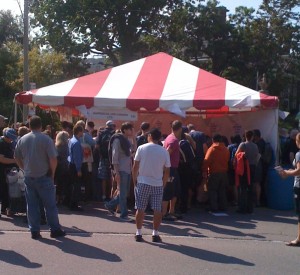IKEA controls the printing industry, apparently. Or at least, that’s the impression I got from the articles that were flying around a couple of weeks ago about how the changes that were made to the BILLY bookshelf sold by IKEA mean that novels are not going to last much longer. (http://www.thestar.com/
That’s right. Apparently it’s the size of the bookshelf that dictates what is being published, not, you know, what the publishing industry is actually doing and what people are buying. I know there are market forces at play dictating what people buy and why they buy it, but I am of the firm opinion that this is very premature, and also, of course, when they changed the bookshelf they made it bigger. That means not only can it hold bigger books, it can also hold novels.
 Anyway, I just found the timing of reading this article to be fortuitous, since a few days after I read it I happened to end up at Word on the Street. Word on the Street is an annual festival of the printed word that has been happening in Toronto since 1990, and has in recent years spread to other major Canadian cities. This year’s event in Toronto shut down University Ave, one of the major downtown streets, from Bloor Street to almost College Street, approximately 1 kilometer, and attracted almost 200,000 people in one day.
Anyway, I just found the timing of reading this article to be fortuitous, since a few days after I read it I happened to end up at Word on the Street. Word on the Street is an annual festival of the printed word that has been happening in Toronto since 1990, and has in recent years spread to other major Canadian cities. This year’s event in Toronto shut down University Ave, one of the major downtown streets, from Bloor Street to almost College Street, approximately 1 kilometer, and attracted almost 200,000 people in one day.
Word on the Street is essentially a publishing industry trade show for the consumers. Published and Bookstores set up booths to sell books, to showcase upcoming books, and to advertise themselves. There are readings, sales, author signings, lectures on a variety of publishing related topics, and, in my expertly unscientific method of counting (I wandered around for two hours) I saw exactly ONE booth dedicated to eBooks, specifically, a Sony eReader booth. It was a tasteful, if a bit sparsely attended, booth. When I walked by, as compared to all the bookseller’s booths that were crammed full of people, there were only a handful of people in there talking to booth staff about the eReaders. It was a great feeling to walk through this festival seeing so many people there simply because they love books. There were crowds three or four deep at any booth that had books for sale (like in the photo off to the side here), huge line-ups to meet authors, and standing room only at any of the lectures.
In my time wandering I came across a lecture at the Humber School of Writers tent on eBooks and the publishing industry by a woman whose name I unfortunately did not find out. She raised the point that, although eBooks account for 10% of all book sales as of the last industry surveys, that means that 90% of all book sales are still print books (a stat that I feel backs up what I’ve argued about in previous posts about the state of the eBook industry). She went on to discuss how eBooks can be a good thing for certain groups within the publishing industry, namely authors, since it allows them to cut out the middle-man and offer their books directly to the customer. (This can, of course, be tied into my thoughts on bookstores having print-on-demand services)
All in all, Word on the Street was an insight into what is actually going on in the publishing industry, and the bookselling industry, in Canada today. There is still a huge demand for printed books, and for people to sell them. People love books, and no matter what newspaper commentators will have you believe, IKEA does not control the publishing industry.

I think it is a pretty dumb idea that simply resizing a popular bookshelf means the demise of books. If that were anywhere near true would they continue to call it a bookcase? Has it yet been shown that the ‘new’ resized Billy bookshelf will even sell?
Found this – http://www.edrants.com/ikeas-billy-bookcase-the-real-story/ – from an Ikea spokeman, “We are not removing the original Billy,” … “It’s interesting that everybody has jumped on this.” Fom the link, “The Billy bookcase with the 11 inch depth will still be stocked. Production will not be curtailed. An additional Billy bookcase, with a 15 inch depth, will be introduced in all countries — an effort to respond to how customers are presently living their lives.” – Translated means: Some people use bookshelves for doodads and knickknacks.
So it goes…
PRY
~~~~
IKEA’s bookshelves don’t reflect my book-buying habits any more than the size of the bookmarks for sale at my local bookstore.